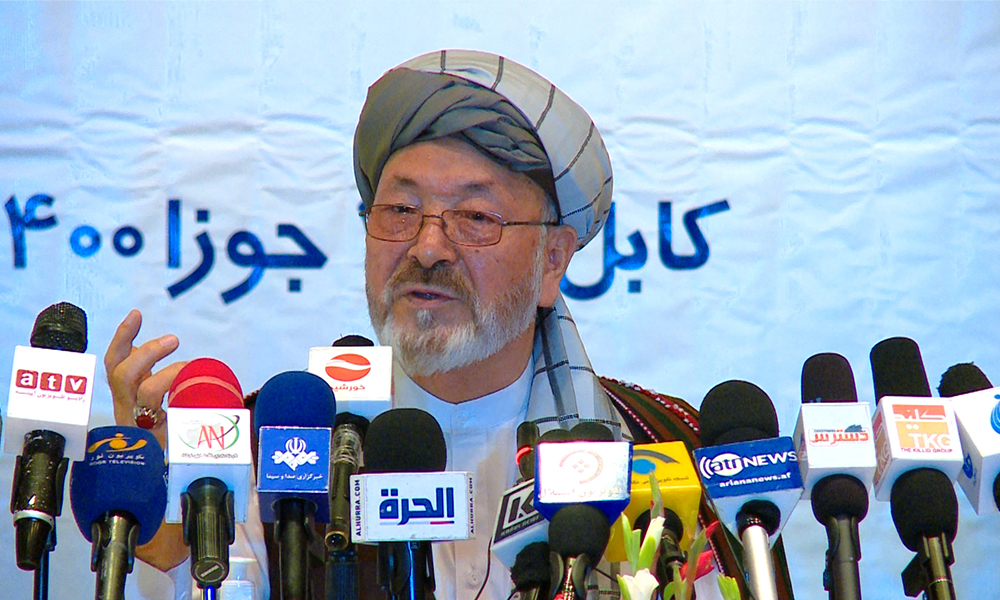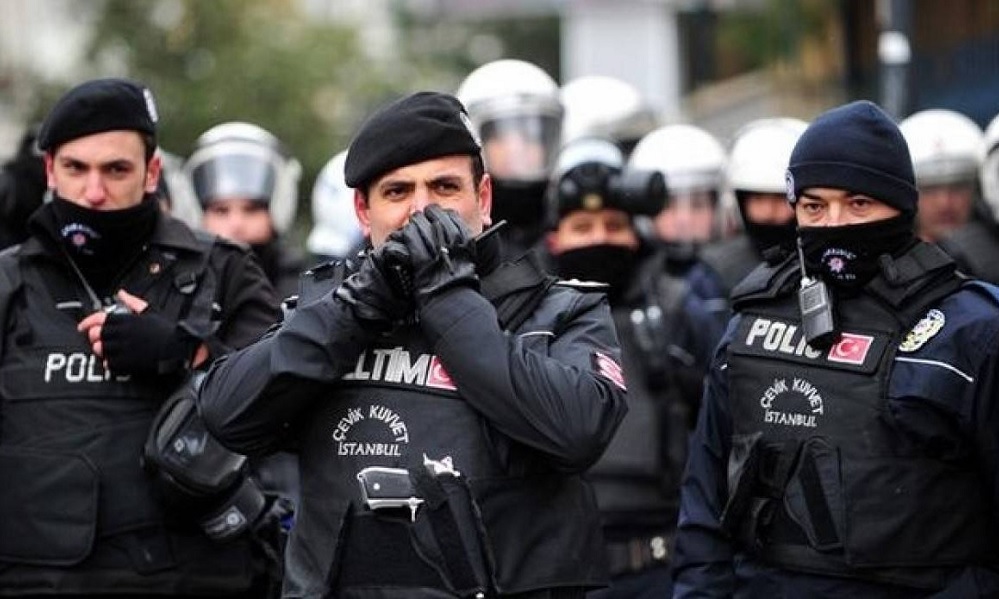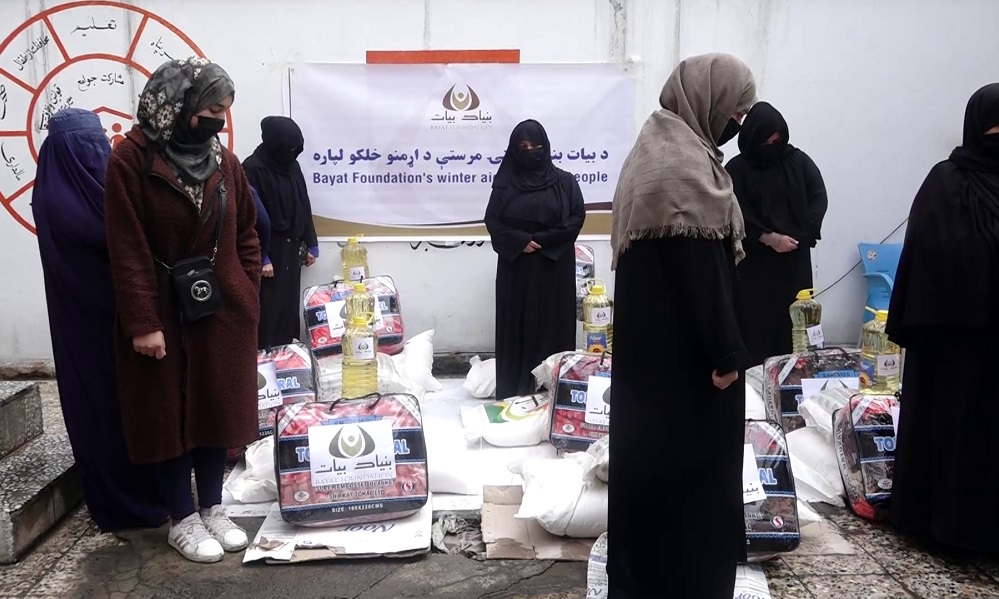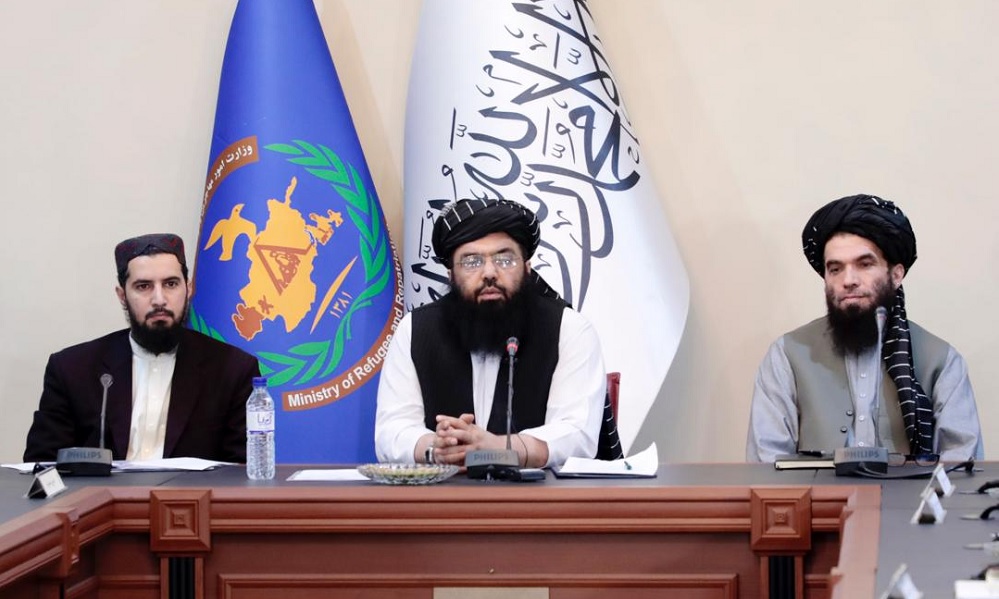Latest News
Khalili labels attacks on Hazaras an act of genocide

Mohammad Karim Khalili, leader of Hezb-e-Wahdat-e-Islami Afghanistan party, on Sunday warned insurgents against continuing attacks targeting western parts of Kabul and “systematic massacres of Hazaras” and said that the perpetrators of these “tragedies” would force the Hazara people to rise up and defend themselves.
Khalili, who was also second vice president under former president Hamid Karzai, said that if Hazaras are forced to defend themselves, they would be able to defend themselves in other ways.
Speaking at a press conference in Kabul, Khalili said that in recent months, the Hazara people have been killed in “catastrophic” ways, in the name of “ethnic and tribal” targeted killings or by “suicide bombings.”
He said based on the interpretation of jurists and scientific discussions, any type of ethnic-specific killings is a clear example of genocide.
Khalili said the Hazara people have been consistently targeted over the past 20 years.
“When these people stand against this kind of movement and shout the voice of justice, it does not mean confronting other ethnic groups,” Khalili said.
Khalili also pointed out that over the past few years, all the people of Afghanistan have been victims of violence and war and all the people have shared in these sacrifices. However, he added that there is no justification for this and the goal is to annihilate a nation.
Khalili explained that during this period, the Hazara people were however specifically targeted because of their ethnicity, on roads, at mosques, schools, training centers, wedding halls and sports clubs, “and were covered in dust and blood”.
Khalili asked what the interpretation of this act was – if not genocide?
“We have two types of casualties, one on the battlefield, in which we have casualties from all the tribes, and the people take their martyrs and bury them in honor, and we stand by the rest of the people; but once again in another way – they kill and want to de-identify the people, and according to their lawyers, de-identification is a type of genocide,” Khalili added.
He pointed out that other Hazara people had raised their voices just because of the recent incident and called on all the people of the country to unite with this nation.
“The boredom of the people of Hazara is over and it is not against any people or side, but against criminal gangs.
We wish all the tribes to comply with the sufferings of the Hazara people and we ask the people to help the people in this indictment,” Khalili said.
“We demand the Pashtun brothers, Uzbeks, Tajiks and other ethnic group’s lawyers support the Hazara people in this matter,” he said.
“Criminals are trying to strip this nation (Hazara) of their identity by any means.”
Khalili also called on the Independent Human Rights Commission and international organizations to examine recent incidents and attacks that happened in the Hazara and Shiite communities.
On the other hand, the leader of Hezb-e-Wahdat-e-Islami Afghanistan criticized the government for failing to provide security to Hazaras. He said that the leaders of the government have a responsibility to ensure the safety and security of the people in accordance with the constitution.
Khalili added that the government cannot distance itself by accusing criminals.
“According to the constitution, the leadership of the government is responsible for ensuring the security of the people, the government cannot shower itself lightly here, and the government must clarify who is the perpetrator and who is behind these incidents,” Khalili said.
Khalili also said that the president must help the people.
On the other hand, the Khalili stated that if the goal of massacring Hazara people was to destroy this group – it would not be possible.
“If the aim of this action is to eliminate the Hazara people, it is not possible at all.The restlessness of a Hazara people does not mean fear,” Khalili said.
His comments come after at least six bombings took place in western Kabul in the past two weeks, which is home to mostly Hazaras. The blasts mainly targeted passenger cars and killed at least 28 people and injured nearly 30 others.
Talking about peace in Afghanistan Khalili called for an “agreed peace” settlement.
“We will achieve lasting peace when all the people, parties and stakeholders are partners and you find yourself in the peace process. Imported peace is not effective at all,” Khalili said.
Khalili also called on all parties including the Taliban to grab the opportunity for peace and urged parties to “not let this opportunity be wasted.”
“I also say to the Taliban that we want such a peace that all parties see themselves in.”
“The roots of the conflict are resolved when compromise is reached, not through political compromise, and the peace process will succeed when it becomes a process of reconciliation,” he said.
Latest News
Turkish intelligence captures a Daesh member near the Durand Line

Turkish intelligence agents have captured a senior member of Daesh near the Durand Line, reportedly preventing planned suicide attacks in Turkey and other countries, according to Turkey’s state-run Anadolu Agency on Monday.
The suspect, identified as Mehmet Goren, is a Turkish citizen. He was apprehended during a covert operation and transferred to Turkey. Details on the timing of the operation or the involvement of Afghan and Pakistani authorities were not disclosed.
According to the report, Goren had risen through the ranks of Daesh and was allegedly tasked with carrying out suicide bombings in Turkey, Pakistan, Afghanistan, and Europe.
Daesh has a history of deadly attacks in Turkey, including the January 1, 2017 shooting at an Istanbul nightclub that killed 39 people.
Anadolu Agency reported that Goren’s arrest also provided intelligence on the group’s recruitment strategies and planned activities.
Latest News
Dozens of needy families in Kabul receive winter aid from Bayat Foundation

Dozens of needy families in Kabul’s fifth district have received essential winter assistance from the Bayat Foundation, as part of ongoing efforts to ease hardship during the cold season and worsening economic conditions.
According to foundation officials, the aid package includes staple food items such as flour, rice, and cooking oil, along with warm blankets to help families cope with freezing temperatures. Haji Mohammad Ismail, Deputy Head of Bayat Foundation, said the distribution began in Kabul and will soon be expanded to other provinces.
“Our assistance includes flour, rice, cooking oil, and blankets,” Ismail said. “Today, we started distributing these items in Kabul’s fifth district, and God willing, the aid will reach other provinces in the near future.”
Afghanistan continues to face widespread poverty, unemployment, and food insecurity, with many families struggling to meet basic needs, particularly during winter when access to work and heating becomes more difficult.Humanitarian organizations and charitable foundations have stepped up relief efforts to support those most affected.
Beneficiaries welcomed the assistance, describing it as a lifeline. “May God bless you for helping the poor. We had nothing and no work,” said one recipient. Another added, “Thank you for your help. Our flour was almost finished.”
Bayat Foundation officials stressed that winter aid distributions will continue in Kabul and other provinces in the coming days, as part of their broader commitment to supporting needy families across the country.
Latest News
Nearly seven million Afghan refugees return home since Islamic Emirate’s takeover

Since the Islamic Emirate came to power, approximately 6.8 million Afghans have returned home, either voluntarily or forcibly, from neighboring countries and other nations, according to the Minister of Refugees and Repatriation.
Mawlawi Abdul Kabir, speaking at a meeting on finalizing a draft plan for a permanent migration solution in Afghanistan, added that 1.3 million Afghans have been internally displaced due to natural disasters during the same period.
With winter approaching, widespread poverty and severe cold are threatening thousands of lives. Meanwhile, the forced expulsion of Afghan migrants from neighboring countries, particularly Iran and Pakistan, continues.
The Islamic Emirate has repeatedly urged neighboring states to allow migrants to return voluntarily. According to UNHCR, over two million Afghans have returned from Iran and Pakistan since the start of 2025.
-

 Latest News3 days ago
Latest News3 days agoAfghan border forces prevent illegal entry of hundreds into Iran
-

 Latest News3 days ago
Latest News3 days agoPakistan summons Afghan diplomat over deadly attack in North Waziristan
-

 Latest News2 days ago
Latest News2 days agoAfghan health minister calls for medical cooperation between Kabul and New Delhi
-

 Latest News1 day ago
Latest News1 day agoAfghanistan signs 30-year deal for marble mining in Daikundi
-

 Latest News3 days ago
Latest News3 days agoJapan allocates nearly $20 million in humanitarian aid for Afghanistan
-

 Latest News2 days ago
Latest News2 days agoKarzai urges reopening of girls’ schools and universities for Afghanistan’s bright future
-

 Health5 days ago
Health5 days agoAfghanistan seeks India’s support in standardizing traditional medicine
-

 World5 days ago
World5 days agoUS readies new Russia sanctions if Putin rejects peace deal, Bloomberg News reports
























